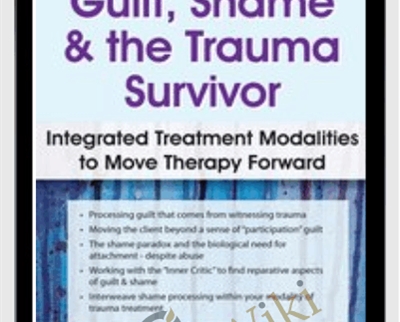$219.99 Original price was: $219.99.$83.00Current price is: $83.00.
6 Hours 08 Minutes
Guilt is about what somebody has done. Shame is about who somebody is. Clients with sexual and physical abuse have two problems: who they are, and what they have done. Wouldn’t most people feel hopeless at that point? Wouldn’t most clinicians feel overwhelmed?
 Purchase this course you will earn 83 Points worth of $8.30
Purchase this course you will earn 83 Points worth of $8.30Elevate your skills with the Guilt, Shame & The Trauma Survivor: Integrated Modalities to Move Therapy Forward – Lisa Ferentzv course, available for just $219.99 Original price was: $219.99.$83.00Current price is: $83.00. on Utralist.com! Browse our curated selection of over 60,000 downloadable digital courses across diverse Uncategorized. Benefit from expert-led, self-paced instruction and save over 80%. Start learning smarter today!
Guilt is about what somebody has done. Shame is about who somebody is. Clients with sexual and physical abuse have two problems: who they are, and what they have done. Wouldn’t most people feel hopeless at that point? Wouldn’t most clinicians feel overwhelmed?
Resolving these two pervasive, paralyzing issues absolutely moves therapy forward but requires a host of psychotherapeutic interventions.
Watch Lisa Ferentz in this recording to learn cognitive, emotional, somatic, expressive, and psychoeducational techniques all used at key moments in therapy to have the fullest impact on resolving these pivotal issues. As a trauma therapist, author, and international presenter, Lisa Ferentz has spent 35 years working with the deepest levels of shame and guilt, honing integrated practices specific to the client’s readiness to address these intense emotions.
Case examples are woven in throughout the day to help you learn how guilt and shame surround unmetabolized traumatic experiences, including sexual abuse, and the profound and confusing dynamic of pleasure that occurs in many instances for male and female victims. The recording will include crafting psychoeducation with practical cognitive techniques, self-compassion, and even expressive modalities – in addition to experiential activities to help you create a treatment plan adapted to your specific clients and trauma treatment modality.
- Describe the differences between guilt and shame and why shame impedes healing in trauma therapy work.
- Identify at least three specific dynamics of trauma and early childhood coping strategies that promote and sustain shame.
- Identify four indirect benefits that clients receive from retaining guilt and shame emotions.
- Explain the role of the Inner Critic and Internal Family Systems as a therapy model that promotes shame reduction.
- Describe the role that attunement and the therapeutic relationship play in helping clients process shame.
- Implement at least two creative strategies to enhance client curiosity and self-compassion in therapy.
- Design a treatment plan that incorporates three creative strategies that promote shame healing that helps to move trauma therapy forward.
Get Guilt, Shame & The Trauma Survivor: Integrated Modalities to Move Therapy Forward – Lisa Ferentzv, Only Price $87
Guilt, Shame and Common Client Misconceptions
- The nature of abuse specific to your client
- Common misconceptions of guilt
- Life experiences that manifest as guilt
- The caretaker as perpetrator
- Attachment and abuse
- ”Participation” guilt in sexual trauma
- Case study: when Susan believed the abuse was her fault
Psychoeducation: Navigating Guilt
- Assess and identify the presence of guilt and shame
- The meaning and function of both guilt and shame as adaptive for survival
- Finding ways to make guilt productive and reparative
- Self-destructive coping behaviors
- From paralyzed to taking extraordinary action
- Reframe symptoms
- Cognitive reframing & behavioral strategies
- Case study: Janet and survivor guilt
Shame: The Root of Who I Am
- The mistake of using guilt and shame interchangeably: for clinician and client
- Pervasive and debilitating: intractability of shame emotions
- When your client presents as “hopeless”
- The trauma survivors’ DSM: dirty, crazy weird, abnormal
- Case study: Alex’s inner critic and its impact on self-worth
Treatment Planning: Techniques from Internal Family Systems (Schwartz)
- Working with parts, the language and clinical benefit
- The Inner Critic: the protector part for future survival
- Exploring the secondary gain of shame and why letting go is complicated
Cognitive and Emotional Antidotes to Shame in the Clinical Setting
- Leading the client to curiosity
- Working with attachment and familial loyalty
- Self-compassion: transformational skills that evoke empathy
- The impact of self-talk
- Writing experiential: the crossroad of a thought
Integrating Creative Modalities to Process Guilt & Shame
- Using art therapeutically – processing clients’ artwork
- Experiential: Body Mapping
- Accessing somatic resources that help reduce guilt and shame
- Experiential: Two-handed writing to increase compassion between parts
- Exploring spirituality and religious observance
Get Guilt, Shame & The Trauma Survivor: Integrated Modalities to Move Therapy Forward – Lisa Ferentzv, Only Price $87
Tag: Guilt, Shame & The Trauma Survivor: Integrated Modalities to Move Therapy Forward – Lisa Ferentzv Review. Guilt, Shame & The Trauma Survivor: Integrated Modalities to Move Therapy Forward – Lisa Ferentzv download. Guilt, Shame & The Trauma Survivor: Integrated Modalities to Move Therapy Forward – Lisa Ferentzv discount.
Cultivate continuous growth with the Guilt, Shame & The Trauma Survivor: Integrated Modalities to Move Therapy Forward – Lisa Ferentzv course at Utralist.com! Unlock lifetime access to premium digital content, meticulously designed for both career advancement and personal enrichment.
- Lifetime Access: Enjoy limitless access to your purchased courses.
- Exceptional Value: Benefit from savings up to 80% on high-quality courses.
- Secure Transactions: Your payments are always safe and protected.
- Practical Application: Gain real-world skills applicable to your goals.
- Instant Accessibility: Begin your learning journey immediately after buying.
- Device Compatible: Access your courses seamlessly on any device.
Transform your potential with Utralist.com!
Related products
Uncategorized
= 35 Points
Uncategorized
= 85 Points
= 85 Points
Uncategorized
Proven Fall Prevention Strategies: Exercise, Meds Management and Home Modification – Trent Brown
= 40 Points
Uncategorized
= 30 Points
Uncategorized
Optimizing Compliance and Maximizing Revenue for Ophthalmology and Optometry – Jeffrey P. Restuccio
= 85 Points
= 84 Points
Uncategorized
Disordered Eating Behaviors: Identify and Treat the Underlying Trauma – Lori Kucharski
= 85 Points





